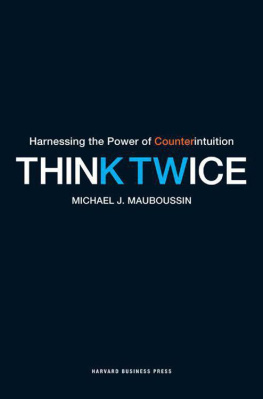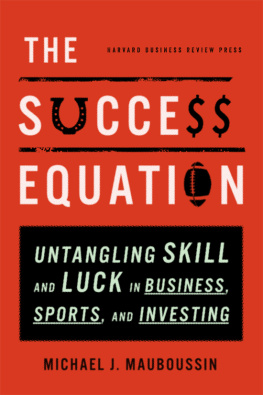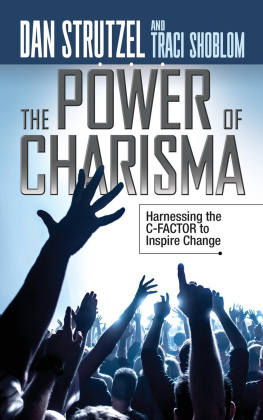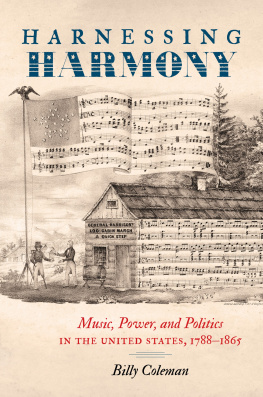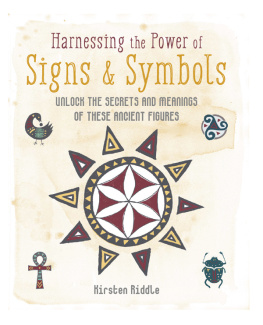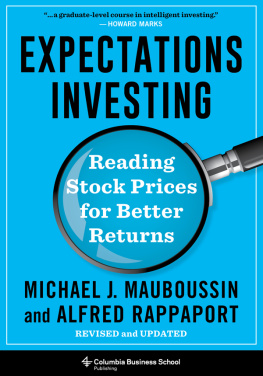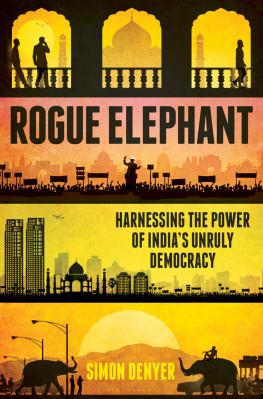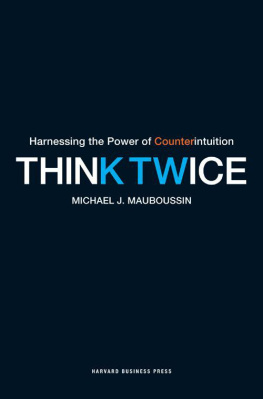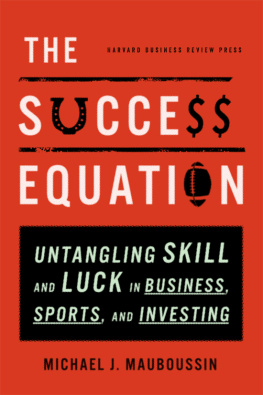Mauboussin - Think Twice: Harnessing the Power of Counterintuition
Here you can read online Mauboussin - Think Twice: Harnessing the Power of Counterintuition full text of the book (entire story) in english for free. Download pdf and epub, get meaning, cover and reviews about this ebook. City: Boston, Mass, year: 2009, publisher: Harvard Business Press;Perseus Books Group, genre: Politics. Description of the work, (preface) as well as reviews are available. Best literature library LitArk.com created for fans of good reading and offers a wide selection of genres:
Romance novel
Science fiction
Adventure
Detective
Science
History
Home and family
Prose
Art
Politics
Computer
Non-fiction
Religion
Business
Children
Humor
Choose a favorite category and find really read worthwhile books. Enjoy immersion in the world of imagination, feel the emotions of the characters or learn something new for yourself, make an fascinating discovery.
- Book:Think Twice: Harnessing the Power of Counterintuition
- Author:
- Publisher:Harvard Business Press;Perseus Books Group
- Genre:
- Year:2009
- City:Boston, Mass
- Rating:3 / 5
- Favourites:Add to favourites
- Your mark:
- 60
- 1
- 2
- 3
- 4
- 5
Think Twice: Harnessing the Power of Counterintuition: summary, description and annotation
We offer to read an annotation, description, summary or preface (depends on what the author of the book "Think Twice: Harnessing the Power of Counterintuition" wrote himself). If you haven't found the necessary information about the book — write in the comments, we will try to find it.
Mauboussin: author's other books
Who wrote Think Twice: Harnessing the Power of Counterintuition? Find out the surname, the name of the author of the book and a list of all author's works by series.
Think Twice: Harnessing the Power of Counterintuition — read online for free the complete book (whole text) full work
Below is the text of the book, divided by pages. System saving the place of the last page read, allows you to conveniently read the book "Think Twice: Harnessing the Power of Counterintuition" online for free, without having to search again every time where you left off. Put a bookmark, and you can go to the page where you finished reading at any time.
Font size:
Interval:
Bookmark:
Copyright 2009 Michael J. Mauboussin
All rights reserved
No part of this publication may be reproduced, stored in or introduced into a retrieval system, or transmitted, in any form, or by any means (electronic, mechanical, photocopying, recording, or otherwise), without the prior permission of the publisher. Requests for permission should be directed to permissions@hbsp.harvard.edu, or mailed to Permissions, Harvard Business School Publishing, 60 Harvard Way, Boston, Massachusetts 02163.
First eBook Edition: November 2009
ISBN: 978-1-4221-7675-7
To Al Rappaport
Mentor, collaborator, friend
CONTENTS
Why Big Brown Was a Bad Bet |
How Your Telephone Number Can Influence Your Decisions |
Why Netflix Knows More Than Clerks Do About Your Favorite Films |
How Accordion Music Boosts Sales of Burgundy |
How Bees Find the Best Hive Without a Real Estate Agent |
How Outsourcing the Dreamliner Became Boeings Nightmare |
How Ten Brits Made the Millennium Bridge Wobble |
Why Investors Excel at Buying High and Selling Low |
How You Can Change Your Decision Making Immediately |
I am deeply grateful to be in the position to learn from thoughtful and wonderful people. The individuals who encouraged, guided, and taught me in the process of writing Think Twice made the long journey rich and fulfilling.
My colleagues at Legg Mason Capital Management have been terrific, providing valuable support and cooperation. That I was able to write this book during a difficult time in the markets is a testament to the organizations commitment to learning. In particular, Bill Miller and Kyle Legg provided me with the needed flexibility to take on this challenge, and I hope that I can repay their confidence in full.
A number of people graciously shared their time and knowledge with me. They told me stories, clarified points, or aimed me in the right direction when I was off track. These include Orley Ashenfelter, Greg Berns, Angela Freymuth Caveney, Clayton Christensen, Katrina Firlik, Brian Roberson, Phil Rosenzweig, Jeff Severts, Thomas Thurston, and Duncan Watts.
Getting ideas right is not always easy. I was privileged to have a small group, each a leader in his field, read and critique sections of the book. My thanks to Steven Crist, Scott Page, Tom Seeley, Stephen Stigler, Steve Strogatz, and David Weinberger.
The Santa Fe Institute has been a tremendous source of learning and inspiration for me. SFI takes a multidisciplinary approach to understanding the common themes that arise in complex systems. The institute attracts people who are intellectually curious and collaborative, and I am appreciative of the willingness of the scientists, staff, and network members to share so much with me. Particular thanks go to Doug Erwin, Shannon Larsen, John Miller, Scott Page, and Geoffrey West.
Reading a draft of a manuscript and providing feedback to the author is difficult and time-consuming. I was fortunate to have a stellar collection of folks, from many walks of life, help me out. These include Paul DePodesta, Doug Erwin, Dick Foster, Michelle Mauboussin, Bill Miller, Michael Persky, Al Rappaport, David Shaywitz, and three anonymous reviewers. Thanks to all of you for your valuable time and very helpful recommendations.
I have long been an admirer of Daniel Kahnemans work. But in doing the research for this book, my respect for his contributions to psychology in general and to decision making in particular grew immensely. He is deservedly a towering figure in psychology, and his work touched almost every idea in this book.
I want to offer special recognition to my friend Laurence Gonzales. Over the years, Laurence and I have asked many of the same questions about decision making. But because he has a very different background and set of experiences than me, he has opened my eyes to many new and useful points of view. Just his willingness to share his thoughts with me has put me in his debt.
But Laurence, a very talented writer, went well beyond swapping ideas with me. Upon receiving a draft of the book, he made the extraordinary offer to edit it in full. Working through his comments was some of the hardest and most rewarding work I have ever done. He taught me about the craft of writing, compelled me to sharpen my thinking, and insisted on clarity. With Laurence, the writing serves the ideas and not the other way around. I cannot thank you enough, Laurence.
Dan Callahan, a colleague at Legg Mason Capital Management, was integral to the project. Dan provided essential research support and coordinated the exhibits. Most importantly, he read numerous drafts of the chapters and provided useful feedback. He also did much of this while juggling other responsibilities, going above and beyond the call of duty. Dan, a big thanks to you.
I would also like to acknowledge A. J. Alper, who thought of the title (including the thin ice angle) and graciously allowed me to use it. A. J. is a pleasure to work with and has a great balance between creativity and business sense.
Id like to thank Kirsten Sandberg, my editor at Harvard Business Press, for shepherding this project from a brainstorming session to a final product. Volleying ideas with Kirsten is always beneficial, and her feedback sharpened the manuscript in important ways. I appreciate Kirsten for never letting me lose sight of our audience, our message, and how to connect the two. Ania Wieckowski was also great throughout the editorial process in matters big and small, and Jen Waring made the production smooth and efficient.
My wife, Michelle, is a constant source of love, support, and counsel. She also encourages me, and allows me, to pursue my passions. Michelles comments about the initial manuscript were direct and on point in a way that only a wife could pull off. My mother, Clotilde Mauboussin, has been a steadfast force in my life and provided me with all of the opportunities I could have asked for. My mother-in-law, Andrea Maloney Schara, is part our familys day-today life and maintains an admirable thirst for learning. Finally, I thank my children Andrew, Alex, Madeline, Isabelle, and Patrick. Each of them helped me to write this book in some way, and I hope that they will find the ideas useful in their lives some day.
I N DECEMBER 2008, two seemingly unrelated events occurred. The first was the release of Stephen Greenspans book, Annals of Gullibility: Why We Get Duped and How to Avoid It . Greenspan, a professor of psychology, explained why we allow other people to take advantage of us and discussed gullibility in fields including finance, academia, and the law. He ended the book with helpful advice on becoming less gullible.
The second was the exposure of the greatest Ponzi scheme in history, run by Bernard Madoff, which cost its unsuspecting investors in excess of $60 billion. A Ponzi scheme is a fraudulent operation in which a manager uses funds from new investors to pay off old investors. Since there is no legitimate investment activity, it collapses when the operator cant find enough additional investors. Madoffs scheme unraveled when he couldnt meet requests for redemptions from the investors stung by the financial meltdown.
The irony is that Greenspan, who is bright and well regarded, lost 30 percent of his retirement savings in Madoffs Ponzi scheme. The guy who wrote the book on gullibility got taken by one of the greatest scammers of all time. In fairness, Greenspan didnt know Madoff. He invested in a fund that turned the money over to the scheme. And Greenspan has been gracious in sharing his story and explaining why he was drawn to investment returns that looked, in retrospect, too good to be true.
Next pageFont size:
Interval:
Bookmark:
Similar books «Think Twice: Harnessing the Power of Counterintuition»
Look at similar books to Think Twice: Harnessing the Power of Counterintuition. We have selected literature similar in name and meaning in the hope of providing readers with more options to find new, interesting, not yet read works.
Discussion, reviews of the book Think Twice: Harnessing the Power of Counterintuition and just readers' own opinions. Leave your comments, write what you think about the work, its meaning or the main characters. Specify what exactly you liked and what you didn't like, and why you think so.

